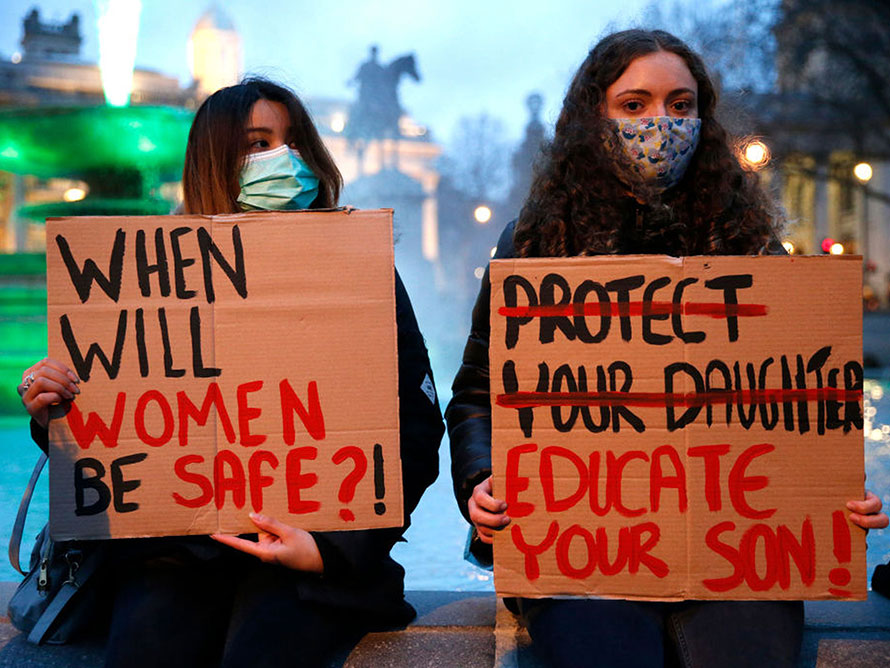Are new laws the right way to tackle the problem? As testimonials of abuse flood social media and protesters take to the streets, everyone seems to agree things need to change. But how?
Tsunami of anger over treatment of women
Are new laws the right way to tackle the problem? As testimonials of abuse flood social media and protesters take to the streets, everyone seems to agree things need to change. But how?
In Britain, the government yesterday announced new measures to protect women from men in public spaces: there will be more street lighting and CCTV. Plain-clothes police will be stationed in pubs and clubs to monitor predators.
But many immediately hit back, saying that these measures only address the symptoms not the causes. They argue that violence is baked into our culture, and boys are taught to abuse women from a very early age.
In the last few days, thousands of school and university students have taken to the website Everyone's Invited to share their stories of abuse at the hands of men: older, younger, friends, family and strangers.
Their harrowing stories have sparked a new conversation about the extremely young age at which women start to experience abuse - and at which boys start to perpetrate it.
Many claim that the problem is the widespread availability of indecent images online. A survey by the NSPCCThe National Society for the Prevention of Cruelty to Children is a charity campaigning and working in child protection in the United Kingdom. found that two-thirds of children aged 15 to 16, and one-third of those aged 11 to 12, had already seen indecent images.
This means that sex education has been taken out of the control of parents and teachers. Instead, many young people are learning about sexual relationships from what they see online.
But these videos generally present sex in a very unhealthy way. They rarely feature partners giving their enthusiastic consentAgreement with full knowledge. to sex. They often show men hurting or degrading their female partners.
Some argue that the problem is much broader than this: that sexual exploitation has expanded into every part of our lives. They point out that adverts often use naked or near-naked women to sell their products. TV programmes like Game of Thrones and blockbuster films use nude scenes to capture the interest of the audience.
They make the point that we are all complicit in structures that dehumanise women. Recent research on men's sexual aggression has shown that dehumanisation, and in particular the denial of women's "human uniqueness", can be a driving factor for men who commit sexual offences. Put simply, some don't see women as people.
"Men need to speak up when women are being treated or talked about in ways that don't feel right or respectful. It's going to feel uncomfortable, and you may be mocked, but men need to challenge other men about their attitudes and behaviours," wrote the respected Durham University sociologist, Fiona Vera-Gray, yesterday.
"Simple actions such as altering pronouns in children's books - so female characters have the rich lives and adventures that the male characters have - will help over time to build a world where it is harder and harder to not see women as people."
So, are new laws the right way to tackle the problem?
Absolutely, say some. The reason so many men feel that they can carry out violence against women is that they are very unlikely to be punished. Introducing new laws to prosecute them, and new legal measures to increase the likelihood that they will be caught, will act as a deterrent against abusive men and ensure that women are safe.
Not at all, say others. New laws are worth very little if women do not feel confident or comfortable bringing their stories to the police. What is needed to guarantee the safety of women is a wholesale shift in our attitudes, ensuring that men are taught from an early age to respect women, and not to objectify, exploit or abuse them.
Keywords
NSPCC - The National Society for the Prevention of Cruelty to Children is a charity campaigning and working in child protection in the United Kingdom.
Consent - Agreement with full knowledge.
Tsunami of anger over treatment of women

Glossary
NSPCC - The National Society for the Prevention of Cruelty to Children is a charity campaigning and working in child protection in the United Kingdom.
Consent - Agreement with full knowledge.
